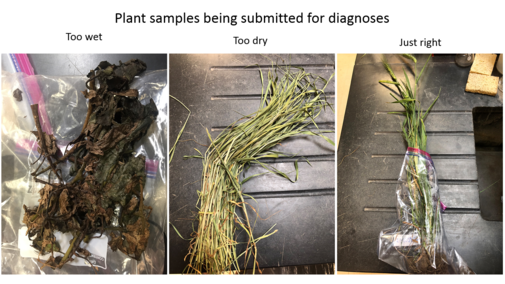Correct identification of insects and other pests and diagnoses of diseases can help you provide effective, targeted treatment. Non-specific treatments may not control the pest and can inadvertently harm beneficial insects as well as waste your money. If you have plant or insect problems, remember that Extension Educators and the UNL Plant and Pest Diagnostic Clinic (P&PDC) are here to help.
To submit samples for diagnosis follow these simple steps. (Additional tips for submitting samples of herbaceous plants, turf, woody plants, other plants, insects, and chemical injury are available on the Sample Submission page in the CropWatch section on Plant Disease Management for Agricultural Crops.)
Tips for Providing Quality Samples
- Send several whole plants, roots and all, that represent all stages of the symptoms being expressed. Often what appears to be a leaf problem can be a root problem.
- Provide photos if available.
- Include “normal” plants from the area near the symptomatic plants for comparison.
- Enclose the root ball in a plastic bag to keep the soil from touching the leaves.
- Place entire plant sample in a plastic bag to reduce drying.
- NEVER ADD WATER TO THE BAG. If the sample is excessively wet, add a dry paper towel to the bag.
- Fill out a Submission Form and include it with the sample. Provide the following information:
-
- Chemical history (current and previous year)
- Planting date
- Crop growth stage
- Symptom description
- How many plants in the area are affected?
- What is the symptom distribution (low-lying areas, field entrance, strips, etc)
- Field history
- Keep samples cool and place in a sturdy container for shipping.
- Using FedEx or UPS, ship early in the week (Monday-Wednesday) to:
Plant and Pest Diagnostic Clinic
448 Plant Science Hall
Lincoln, NE 68583-0722
Costs for Services
Standard Test ($15)
- Standard diagnosis involves examination with the aid of a microscope or other basic diagnostic tools.
- Our diagnosticians will provide as accurate an identification as possible, using available resources.
- We also will provide additional information and recommendations, as appropriate.
- Every attempt will be made to return the completed Specimen Identification Form within five working days.
Specialized Tests
Fees for these tests are assessed in addition to the standard fee.
- Culture for Pathogen Identification (insects, fungal and bacterial pathogens) — $10
- Plant Parasitic Nematode Assay (nematodes other than SCN) — $40
- Miscellaneous Serological Test (Specialized fungal and bacterial tests) — $10
- Bacterial ID using Biolog System — $20
- Additional fees may occur if more tests are necessary.
Each sample should include the appropriate fee (check or money order) made out to UNL P&PDC. The amount depends on the level of diagnosis desired as indicated.

